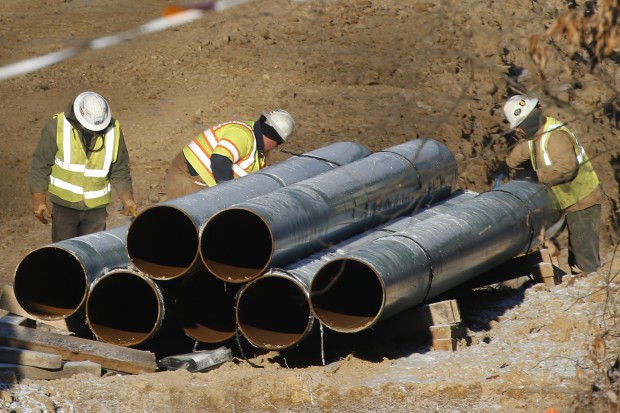Landowners brace for start of tree-felling by Constitution Pipeline builders
-
Jon Hurdle
Landowners in Susquehanna County prepared for a last-minute confrontation with tree-felling crews who were expected to begin clearing forest on Friday to make way for the planned Constitution Pipeline to take natural gas from Pennsylvania’s Marcellus Shale into New York State.
Opponents of the tree-clearing plan said three landowners in New Milford Township have not accepted offers of compensation from the pipeline operators, and have lost their challenges to the company’s assertion of eminent domain to build the pipeline on their land.
The tree-felling, which critics said was due to begin at 7 a.m. Friday, was approved by the Federal Energy Regulatory Commission on January 29 as part of an implementation plan for construction of the 124-mile pipeline, which begins in Northeast Pennsylvania’s Susquehanna County. Most of the line would be built in New York State.
The land that is due to be cleared includes about five acres of a 23-acre New Milford lot that has been owned by Catherine Holleran and her family since the 1950s.
In the last seven years, the family has been operating a commercial maple syrup operation from the trees on the land, and they say the tree felling would destroy the equipment set up for this year’s harvest at a time of year when the sap is flowing from the trees.
A federal judge in Scranton ruled in March 2014 that a portion of Holleran’s land should be condemned under eminent domain, allowing the pipeline company to move ahead with its plans for construction.
Holleran, 59, a teacher, said she had not accepted an offer of compensation from the company but she had been told the tree-felling would go ahead anyway. She declined to say how much the company had offered.
“They are not supposed to do any construction until there’s actual compensation,” she told StateImpact. “No compensation has been awarded yet because we still have to determine that at the end of this whole process, but this past week they got a partial motion to proceed, saying that it was OK for them to come through with un-mechanized cutting, which is just guys with chain saws.”
Whenever they arrive, the crews are expected to face a protest by opponents such as environmental groups whose members were arriving at the Holleran property on Thursday, said Holleran’s daughter, Megan.
Megan Holleran, an archaeologist who works part-time in the syrup-harvesting business, said she didn’t know what form the protest would take but she hoped it would remain peaceful. “We are trying to keep this very civil and very calm,” she said.
Cutting trees on the Pennsylvania portion of the route could be premature because New York State has yet to issue all its permits, she said.
In a path along the southern part of Pennsylvania, some other landowners are fighting eminent domain actions by Sunoco Logistics to build its 350-mile Mariner East 2 pipeline across many parcels of private land.
Christopher Stockton, an spokesman for the Williams Companies, one of the builders of the pipeline, said the company has made plans to deal with any protest.
“We are coordinating with local authorities to ensure that our tree-felling work can be conducted in a safe manner and that members of the public are protected,” Stockton said. He declined to specify the timing of the felling operation but said the earliest it could begin would be Friday.
Stockton said the company considered the Holleran family’s request to reroute the pipeline to an adjacent lot to the west of their land, but rejected the option because the presence of a quarry there created technical challenges.
Still, he said the company had altered its plans in response to the family’s request.
“In an attempt to accommodate the landowner, we did relocate the line to follow the western end of the property boundary for much of the crossing to minimize impacts,” he said.
Stockton declined to say how much the company had offered the Hollerans for the easement on their land but argued that it had dealt “fairly” with all landowners, and in many cases had offered “two or three times” the appraised value of the land.
Critics contend that the pipeline industry has taken an unyielding approach to landowners who stand in its way.
“It’s significant that the industry is no longer interested in negotiating with landowners,” said Alex Lotorto, Shale Gas Program Coordinator for Energy Justice Network, a grassroots group that represents communities in their dealings with polluters.
Lotorto argued that individual landowners have little chance of beating the combined forces of the gas industry and FERC, which is often accused of rubber-stamping the industry’s plans.
“If you disagree with their offer, your land gets seized by the federal government,” he said.
Megan Holleran said FERC had approved the pipeline project with little regard for local objections, and had concluded that its benefits outweighed negative impacts on landowners such as her family.
“We’ve never got any indication that our concerns are being truly considered,” Megan Holleran said.
Tamara Young-Allen, a spokeswoman for FERC, denied that the agency had ignored the concerns of pipeline opponents, and noted that it had received a motion to stay the tree-felling by Holleran and Lotorto.
Young-Allen said she could not comment on when the commissioners might consider the motion, and said that anyone who is unhappy with a commission decision can take the matter to a federal appeals court.

















